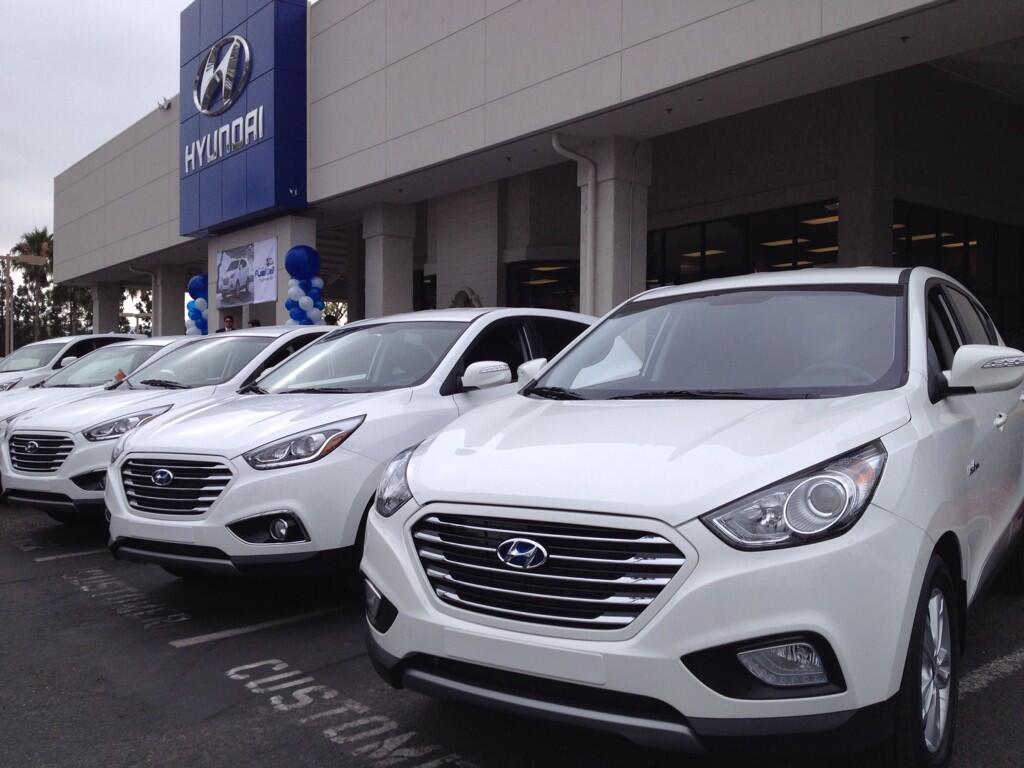Every so often, an auto executive will say something that raises an eyebrow or two.
In this case, a Hyundai executive suggested that while his company had received no money for its hydrogen vehicles from the U.S. government, the Tesla Motors network of Supercharger DC fast-charging stations for electric cars was paid for using "money that has come from grants and loans from the government."

First 2015 Hyundai Tucson Fuel Cell delivered to lessee at Tustin Hyundai, June 2014
Michael O'Brien is head of U.S. product planning for Hyundai; his assertion came during a discussion of the Korean automaker's view of hydrogen fueling infrastructure and which entities should provide it.
DON'T MISS: Hyundai: Gasoline Suppliers 'Should Invest In Hydrogen Infrastructure'
Indeed, it seems irrefutable that Hyundai received no direct funding from the U.S. or state governments for its more than a decade of research and development into hydrogen-fueled vehicles.
But given that Tesla repaid its entire $465 million low-interest loan from the U.S. Department of Energy more than a year ago--several years ahead of schedule--we thought the Silicon Valley electric-car maker might want to respond to O'Brien's assertion.
Indeed, Diarmuid O'Connell, Tesla's vice president of business development, was more than eager to set the record straight from his point of view.
Tesla Motors Supercharger network in Summer 2014 - map as of July 15, 2014
'Furious' at charge
"I am furious at any allegation that any public money was spent on the Supercharger network," he told Green Car Reports.
"Those sites have been paid for entirely by Tesla Motors--which continues to spend money in expanding the network."
"This stands in stark contrast to certain foreign carmakers, including Hyundai," O'Connell continued, "who have no manufacturing presence in California but expect the state's taxpayers to spend up to $200 million to set up hydrogen stations" for their future fuel-cell vehicles.
Confused by charging type?
Perhaps Hyundai's O'Brien confused Tesla's DC fast-charging network with slower 240-Volt Level 2 public charging stations, which have been funded by multiple Federal and state programs.
Or perhaps he meant to suggest that Tesla took advantage of working capital provided by the DoE loan between 2009 and 2013 as it began to plan and build out early Supercharger sites.

2015 Hyundai Tucson Fuel Cell at hydrogen fueling station, Fountain Valley, CA
Either way, the spat illustrates the continuing sensitivity of all carmakers to accusations of government backing.
In the wake of the 2009 GM and Chrysler bailouts, the troubles of the DoE's advanced-technology vehicle manufacturing (ATVM) loan program, and the Solyndra bankruptcy, it appears that Government backing for anything automotive remains politically sensitive--if not outright toxic.
States must fund fueling
That said, the big question for Hyundai executives--along with those from Toyota and Honda, who also plan to launch hydrogen-fueled compliance cars--is which entities they believe will see a profit motive in spending the billions of dollars required to establish a nationwide hydrogen fueling network.
Even O'Brien acknowledged that. He concluded his assessment of the state of hydrogen fueling by noting, "For us, the big breakthrough will come when other states start investing in infrastructure."
That sounds like government funding to us.
_______________________________________________












